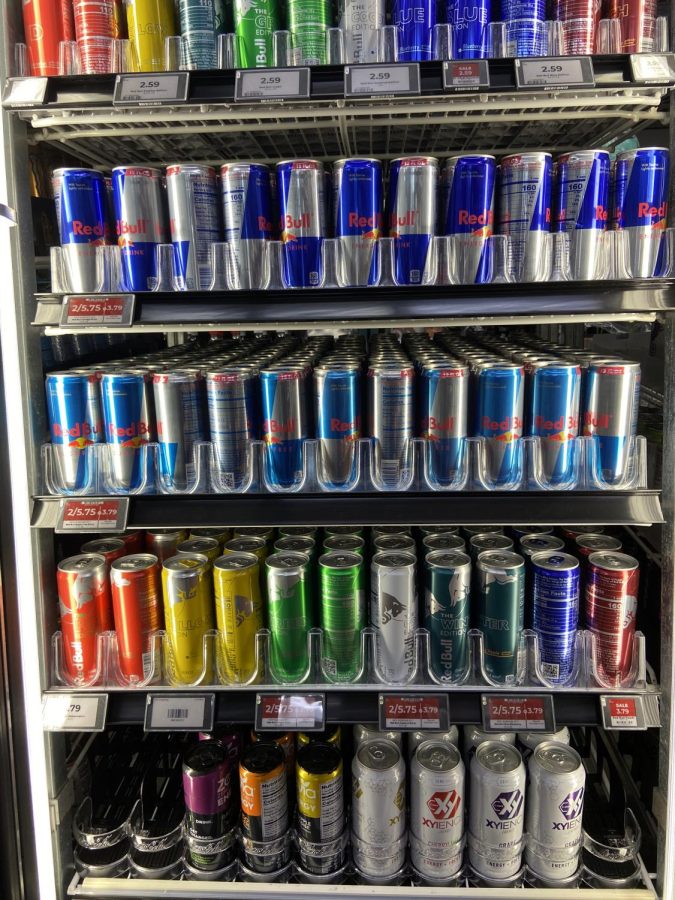The dangers of energy drinks
Every day, 85% of people in the U.S. consume at least one caffeinated drink.
November 16, 2022
People of all ages seem to need some type of caffeine to get their day started. In the morning, many people reach for some kind of coffee as their drink of choice, although energy drinks have become more and more popular within the last few decades, especially among teens and young adults. While energy drinks are successful in providing mental stimulation and focus for many individuals, they are accompanied by ingredients that can cause detrimental health effects, particularly when consumed on a regular basis.
According to healthyfoodamerica.org, 58% of Americans consume more than the Dietary Guidelines for Americans’ recommended amount of sugar per day, which is less than 12 teaspoons (50 grams) daily. Eating excessive amounts of sugar can lead to obesity, high blood sugar, high blood pressure and heart problems over time. American’s diets in general are filled with unnecessary amounts of added sugar, and energy drinks certainly do not help this matter. Even the smallest cans of energy drinks can ‘take up’ over half of your recommended daily intake. For example, an 8.4 ounce (about one cup) can of Red Bull contains 27 grams of sugar, which would already account for over half of the daily recommended intake. Not to mention the larger and more popular sizes of Red Bull, the 12 and 16 ounce cans, contain 39 and 45 grams respectively, which inch even closer to containing an entire day’s worth of sugar.
The excessive amounts of sugar and other unhealthy ingredients that energy drinks contain can have detrimental effects on your body, including both mental and physical health. Energy drinks have been proven to cause increased blood pressure, heart problems, anxiety, insomnia and in the long run, problems with metabolism, high cholesterol, blood sugar levels and weight gain, according to clinicaltrials.gov. Many people, especially teenagers who are drawn to energy drinks for their fun flavors, look past the impacts that these fruity and seemingly harmless drinks have on their bodies. Understandably so, it is easy to overlook the negative effects that energy drinks have on our well being when the immediate effects are alertness, mental stimulation and increased focus. However, it is crucial to understand that although positive side effects do exist, there are just as many negatives that often go unseen. This uniquely impacts teenagers and young adults, as many believe that since they are young and in the ‘prime’ of their physical health, the negative side effects will not take a toll on them. While I, as a teenager myself, wish that were true, it is unfortunately not the case. According to the CDC, in 2011 nearly 1,500 adolescents aged 12 to 17 went to the emergency room due to energy drink related issues. Though this is alarming, it does not suggest that teens should not drink energy drinks at all. It just serves as a very serious reminder that these highly caffeinated beverages should only be consumed responsibly and in moderation.
Granted, there are many measures that can be taken to help alleviate a few of the negative side effects. One of the main initiatives is to make sure that you are hydrated before you have an energy drink and that you stay hydrated during and after you finish the drink. This is because the high caffeine contents of energy drinks cause your body to become dehydrated, which in turn can lead to a loss of stamina and body strength. Another way to prevent the nervousness and shakiness that can sometimes be associated with energy drinks is to limit your caffeine intake to the amount that is right for you. In fact, many energy drink companies label their products with recommendations that people under the age of 18 should not consume them, due to their high caffeine content. While this is solely a recommendation and many people under 18 still consume energy drinks, it does serve as a healthy reminder that the amount of caffeine in the products may be too high for younger individuals.
These negative impacts do not mean that energy drinks are the worst thing in the world and should not be consumed whatsoever. Instead, they simply prove energy drinks can have very powerful effects on our bodies and should therefore be consumed with caution. The main takeaway is to keep in mind the effects that these drinks have on your body and to proceed safely from there.









